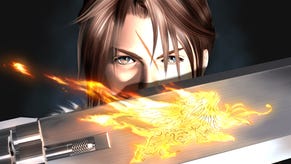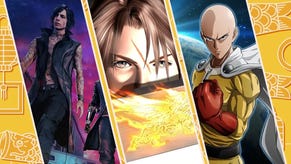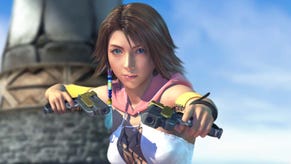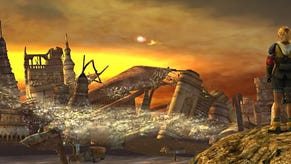Final Fantasy X-2
What do you do after you've saved the world?
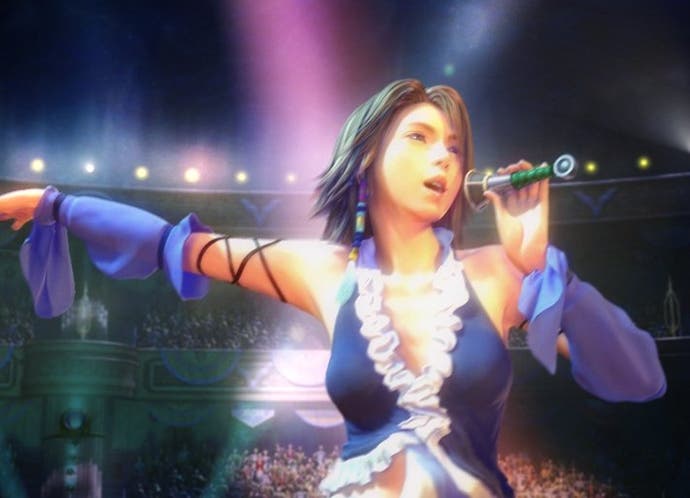
What do you do after you've saved the world? It's a question that most games shy away from to a large degree; you fight your way through the final dungeon, defeat the evil that threatens the planet, the credits roll and then... What? It's all very well to walk off into the sunset, but once you've finished looking dramatic, it's time to take stock of the fact that it's nearly night time, you're in the middle of the desert and you've got to get on with your life. People who save the world aren't exactly a common breed, and it's fair to expect that they might do something more exciting than settling down and growing tomatoes, but this is a stage games generally don't reach, and it's rare to see a glimpse of what happens after the story ends.
Characters in Final Fantasy games have been saving the world for a long time now, and the question of what happens afterwards is one that Square Enix has probably been tossing around the office for years. Final Fantasy X-2 is the first time that the company has ever returned to the world of a previous Final Fantasy game, so it's a unique chance to see what happened to the world of Spira and its people after it was freed from the yoke of its false religion and the fear of the powerful entity Sin, not to mention the other huge upheavals and revelations which came about in the bittersweet ending of Final Fantasy X.
The first answer that Square provides to the question of what you do after you've saved the world is the most obvious one - you party! Our first introduction to the central characters of the piece is at an idol singer concert where the main attraction (sort of) is none other than Yuna, the high summoner heroine of FFX. The theme song here (an English version of Kumi Kouda's Real Emotion) is a supremely cheesy slice of J-Pop, quite the contrast with the heavy metal stylings of FFX's intro music, and the bouncy, happy-go-lucky feel permeates the entire game up to a point. Yuna is no longer the reserved girl of the original title - she's saved the world (even if she lost the man she loved in the process) so she's going to have a good time, dammit, and Yuna's idea of a good time mostly seems to involve shooting a pair of very large shiny pistols and wearing an extremely skimpy miniskirt. You can't argue with that really!
Pirates of the Sky! This sounds familiar...
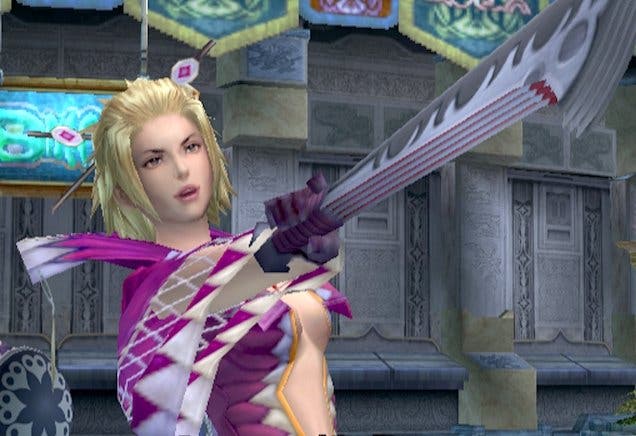
If all that sounds a bit silly, wait until you meet the rest of the cast. Gunslinger Yuna is joined by Rikku from FFX and a brand new character, the gothy and quite funny Paine, in an all-girl troupe of treasure hunters known as the Gullwings, who search Spira for the special spheres which hold the secrets of the world's real past - not to mention a host of other powers. In travelling around the world, they dash about on the most improbable airship of all time - a red monstrosity which owes a lot of design inspiration to easy rider motorcycles - and high five each other a lot, striking silly poses and making lippy comments about other characters they encounter. There's certainly an eerie feeling that the Spice Girls have just invaded the world of Final Fantasy - but once you get past the cheesy camp-ness (and that's admittedly not something everyone will be able to do), it's hard not to enjoy the game's exuberant sense of fun, which is so different from the epic storytelling of other Final Fantasy titles.
Hang on a second - sky pirates? High fives? An exuberant sense of fun? Haven't we heard all of this somewhere before? Well, yes - and it would be fair to say that the game's atmosphere isn't a million miles away from the excellent Skies of Arcadia in a lot of ways. There are critical differences - we already know these characters and locations intimately from FFX, for a start, and Skies of Arcadia wasn't camper than a row of tents at a Boy Scout jamboree, whereas FFX-2 certainly is - but like Skies of Arcadia, FFX-2 also knows when to take itself more seriously, and handles its more thoughtful subject matter in a deft and considered fashion which is both interesting and often surprisingly touching. The impact of the events of FFX upon the world of Spira and upon Yuna herself is explored in some depth, but in an understated way that speaks volumes for the experience and talent of the storytellers at Square Enix.
The world may have been saved after all, but that doesn't mean it's suddenly become perfect - and revisiting some familiar locations from FFX can be quite a shock, to Yuna as much as to anyone else. An early example, but a good one, is her sadness upon arriving at the ruins of Zanarkand once again - only to discover that the campfire where the entire group sat around before entering the ruins has been trampled underfoot by hordes of tourists flocking to the once-sacred city. The game balances the ongoing sense of fun and adventure with a growing sense of misgiving and anger as Yuna watches the peace which she fought to bring about falling apart, as the Ronso threaten to massacre the Guado in retribution for their actions in FFX, while the new factions of the Youth League and New Yevon seem set to resurrect powerful ancient evils that threaten the peace of the world again. It's a very different story to those which have been told by Final Fantasy games in the past, but an interesting and superbly handled one nonetheless.
Let's play dress-up
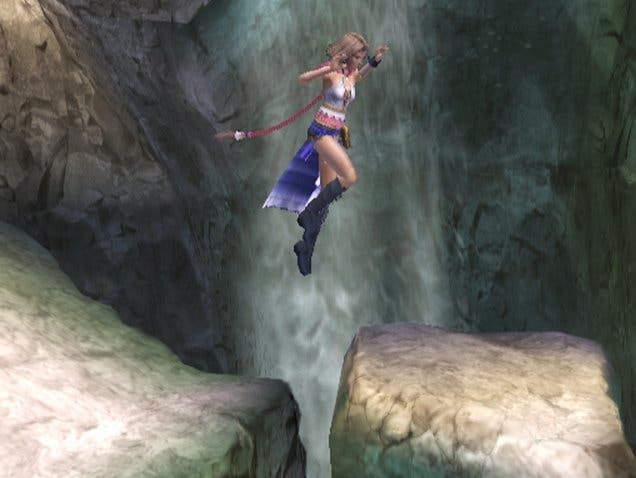
In terms of actual gameplay, as opposed to plot, FFX-2 represents a very significant departure from previous titles in the series. For a start, the game is much less linear than its predecessors - right from the outset, you have access to just about every location in Spira thanks to your airship, and while the game will highlight "hot spots" which generally represent the next compulsory piece of plot development, you can visit other areas as and when you wish, and often pick up missions and quests which are unrelated to the central plot, serving instead to fill in additional background information and provide optional goodies to upgrade your characters. If you just played through the "hot spot" events in order, FFX-2 would almost certainly be an incredibly short game; playing even a selection of the varied and interesting optional missions extends the playtime of the game massively.
Another thing you won't recognise from previous Final Fantasy games is the battle system, which has been completely overhauled since FFX - and makes the rather bold step of introducing real-time battles, which are only turn-based in that you must wait for an action bar to fill up before a character can make a move. Gone is the turn order bar from FFX or the strict turn-based system of prior titles; instead characters act as soon as they can, and can even act simultaneously, with a combo bonus awarded if you time attacks such that they happen within a short space of each other. The system is not entirely unlike Grandia's time bar, but it takes some getting used to at first and new players will probably want to turn the combat speed down in order to avoid getting confused by the large number of things going on at once in most battles.
Another thing which takes some getting used to is the central concept of FFX's combat - namely Dress Spheres, special items which allow your character to transform into a range of outlandish outfits, each with a unique set of abilities. These outfits don't just change the abilities open to you, however - they have a fundamental effect on your statistics, and your character effectively becomes someone totally different when they change costume in a battle. It all starts to make sense when you consider this to be a version of the traditional Final Fantasy job system - and indeed, as well as levelling up in a traditional sense, characters also level up their abilities at specific jobs (such as Warrior, White Mage, Black Mage, Gunner and more esoteric outfits like Berserker or Gun Mage) by wearing those outfits in battle. Getting the most from the game requires a careful balance between using the solid, useful classes such as White Mage and levelling up more unusual but very powerful abilities such as the Gun Mage's various Fiend Hunter attack types.
Gaming Sans Frontieres? (No.)
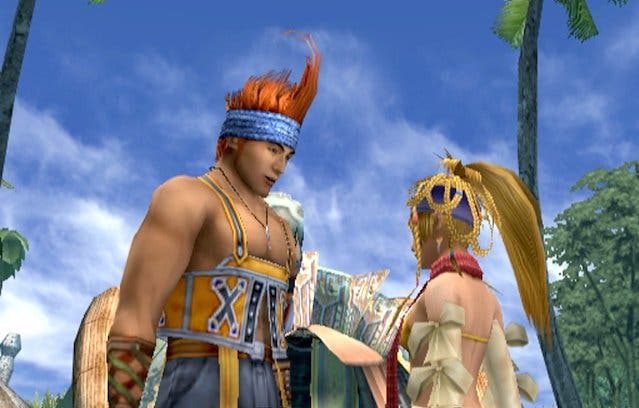
While the battle system seems excessively complex and confusing at first, once you get accustomed to it it's surprisingly good fun - and although we couldn't help but feel that it's a backwards step from the extremely tactical and well-planned battles found in FFX, there's a lot to be said for a game in which the battles pass quickly enough that you genuinely don't mind random encounters at any point. This is admittedly helped by the fact the game simply isn't very difficult - experienced RPG players will plough through it without having to spend much time levelling up or backtracking, although there's still enough content here for it to take quite a long time to finish even at full tilt.
In terms of graphics, there's good news and bad news. The good news is that Final Fantasy X-2 is the best-looking game ever created for the PlayStation 2, and it puts the vast majority of Xbox and GameCube games to shame. It's tough for us jaded games journalists to get excited about console game graphics in general, but the shock when FFX-2 dropped from a rendered intro into in-game graphics with only a minor loss of character detail precipitated a rather loud "holy shit!" from this reviewer. Square must surely be driving the PS2 to its very limits with this game (although the forthcoming Xenosaga Episode 2 looks even better, astonishingly), and in many places it is the yardstick by which PS2 titles should be judged. However, the game also suffers from occasional graphics glitches which, although not really annoying, are a bit surprising in a product this polished.
The really bad news is that once again Square have done a poor job of the PAL conversion for the title, with gigantic borders occupying a good 25 to 30 per cent of your screen space. For most gamers - especially if playing on a decently large TV, say larger than 20" - this won't really be an issue, and we have to say that it didn't impinge on our enjoyment of the game in the slightest. However, if you're playing on a small screen, or if you found the borders in FFX annoying, you might be better off importing a copy of the game from the USA, assuming that that's an option open to you. There's also no 60Hz option in sight, but frankly in an RPG title like this that would be an absolutely pointless thing to include anyway, so it's no great loss. The pre-rendered video, however, runs smoothly and shows no signs of dropping any frames or skipping at any point, which is the key issue here.
Cheese Sandwich
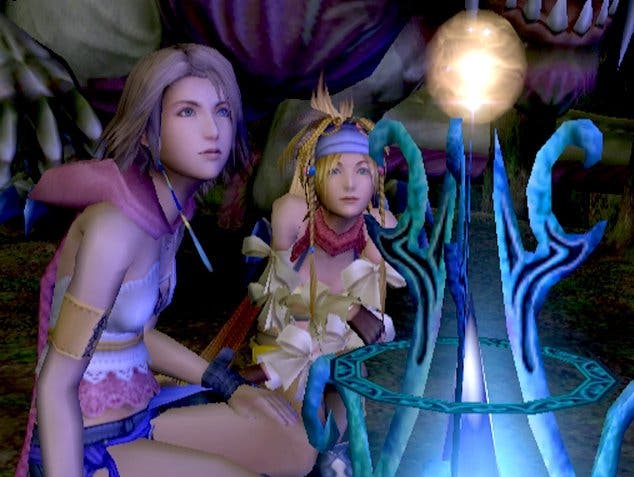
The voice acting in the game is largely improved from FFX with Yuna's voice actress in particular seeming much more confident in the role, which is quite something, as FFX's acting was in itself a pretty decent example of dubbing, although an option to have Japanese voices with English subtitles would have helped rather a lot - not that Square Enix have bothered to include that this time around either, much to our annoyance. The only real irritation is the actor playing the character of Brother, who captains the Gullwings' airship, and speaks in a terrible and obviously faked middle eastern accent - if he'd just shut up (which sadly he doesn't do very often), the game would be doing extremely well indeed in voice acting terms.
Certain other aspects of the game grate almost as much as Brother's voice, such as the inclusion of vaguely pointless jumping puzzles, which are badly implemented and only serve to frustrate players by making them run around trying to jump up walls in order to find new areas. A small but annoying decision has also been made about Tidus' name - because FFX allowed you to rename Tidus at the start, and never actually spoke his name in dialogue as a result, FFX-2 has continued this, resulting in a situation not dissimilar to the Monty Python "Jehovah" sketch from Life of Brian, as characters jump through dialogue hoops to try and discuss him (since his fate is a rather key part of the plot) without ever actually saying the word "Tidus". We kept expecting Rikku to accidentally blurt out "Tidus!" during a long conversation which mostly featured characters talking about "you-know-who" and "him... that boy...", only to be greeted with a hail of stones from a crowd of bearded ladies...
Final X Fantasy?
FFX-2 is a game which is going to polarise opinions - and the split will be made neatly between those who can deal with the bouncy, excessively saccharine and campy theme of the game, and those who find that absolutely off-putting. It goes without saying that if you didn't like FFX you simply shouldn't bother with this title, and if you haven't played FFX at all, FFX-2 is a pointless purchase for you, since none of it will make any sense whatsoever without understanding the events and characters from the first game.
If, however, you're a fan of FFX who is interested to see what happens next and can deal with a bit of light-hearted entertainment rather than demanding a dramatic epic every time you turn on your console, then FFX-2 is a game you should definitely consider. It's extraordinarily well crafted and polished, as most Square Enix games are, and should deliver a good forty hours of entertainment for your money. Once you get past the kitsch trappings of the game, there's a surprising amount of intelligence underlying it all; and although it's definitely a "side story" rather than a full-blown Final Fantasy title, and some aspects of it do feel very experimental, FFX-2 gets far more things right than it gets wrong.

